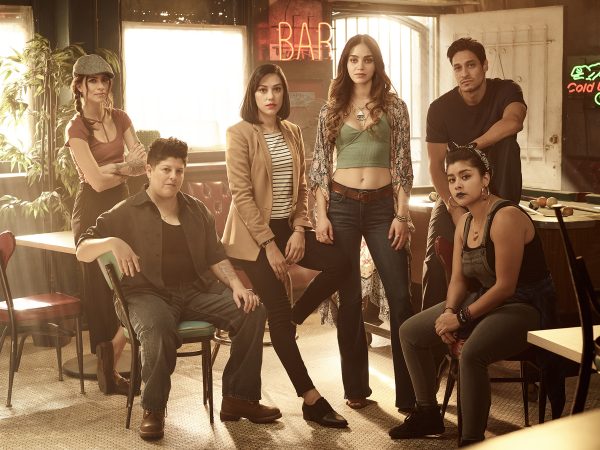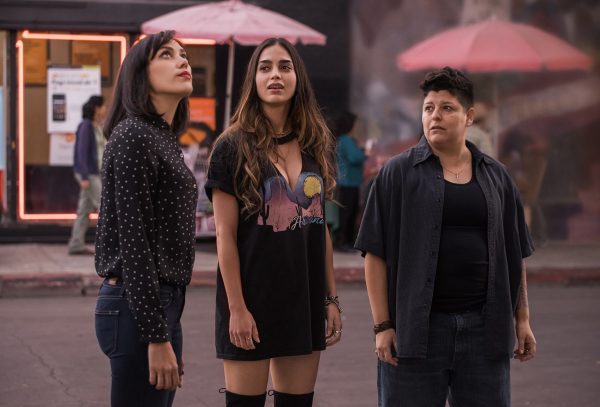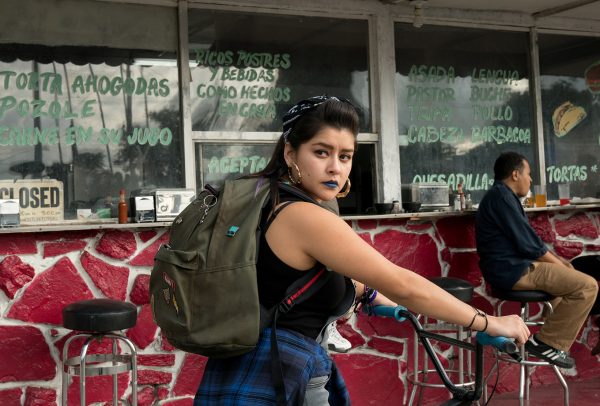Vida is a new drama series about gender issues and gentrification in East LA, airing on Starz TV May 6. It’s only 6 half-hour episodes, so you may binge-watch it as a 3-hour movie. It premiered at SXSW (South by Southwest Film Festival) in Austin, Texas, on March 11, and in Los Angeles at Cine Arte, the Latinx Queer Film Festival, at the LGBT Center, on April 21.

Vida, which means ‘life’ in Spanish, is short for Vidalia. Two sisters, who grew up in East Los Angeles’ Boyle Heights and moved away (Emma lives in Chicago, Lyn in San Francisco), return home after the death of their mother (Vidalia). They find Eddy living in their house and tending the bar, they discover she is their mother’s wife. Emma rekindles her relationship with Cruz, Lyn her love for Johnny, now engaged to be married to his pregnant girlfriend. Marisol, Johnny’s sister, is an activist video blogger fighting against the gentrification of their neighborhood.
I had heard the word Latinx explained by the gay teenage daughter in the first episode of the second season of the Netflix sitcom, One Day at a Time, about a Cuban-American family, dealing with issues like immigration, sexism, racism and homophobia. I had met showrunner Gloria Calderón Kellett last February at a Zocalo panel titled, What It Means to Be American.
I read in the “Speaking Vida” glossary: “Latinx is the gender-neutral alternative to Latino, it also acknowledges that not everyone identifies as a man or a woman.” Other words: bronca=issue, carnal=brother, chipster-Chicano hipster, gente-fication=gentrification, pocho=Spanglish, raschuache=ghetto, raza=my people, vendido=sell-out.
Vida creator Tanya Saracho, who grew up in Texas and Mexico, then moved to Chicago, like older sister Emma, explains: “Emma and Lyn are forced to come together when they inherit their mother’s building in the Boyle Heights area of East LA, that includes tenants and a neighborhood bar that’s very important to the LGBTQ community.”

The actors portraying them describe their characters:
- Melissa Barrera: “Lyn thinks she can live her life on the superficiality of looking pretty, going shopping, being vegan, and dating.”
- Mishel Prada: “Emma’s feelings about her sexuality are pretty shut off. She’s emotionally unavailable. There is a lot of hurt, betrayal, and loss going on.”
- Ser Anzoategui: “Eddy is a butch lesbian from East LA. She made a promise to Vidalia to keep the bar, and her legacy, moving forward in a way that’s proper, with family and tradition.”
- Chelsea Rendon: “As an activist, Mari is all about her community. She’s a feminist, all about women empowerment and breaking through women’s roles in typical Latinx culture.”
- Carlo Miranda: “Johnny’s the guy that if you need help with something, you know you can count on him to be there.”
- Maria-Elena Laas: “Cruz is very comfortable in the community at large and also within the LGBTQ community, she is a social worker at an outreach center in East LA.”
Saracho concludes: “With a Latinx showrunner and a writers’ room that is all Latinx, and half of it queer, Vida is told from inside the community. It’s about family, about coming home, about women. This country was made up by the children of immigrants, and right now, when we’re being dismissed and erased, the biggest political act we can do is portray ourselves authentically and show our true lives.”

The bicycling Marisol is a reference to the East LA feminist group Ovarian Psycos Bike Brigade. Watch trailer of 2017 PBS documentary, check out their website.
To learn about the Chicano Movement of the 1960s and 70s, you may go see the 1967 to 1977 photographs from the activist newspaper “La Raza” at the Autry Museum.
To read essays and poems by 1970s Latina feminists (also Black, Asian, Native American), you may buy the 2015 edition of the 1981 book This Bridge Called My Back: Writings by Radical Women of Color, with a preface by Cherríe Moraga.
